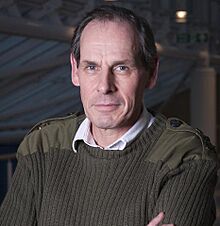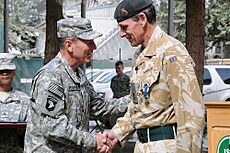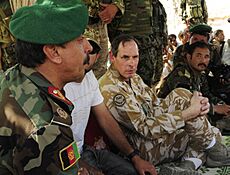Nick Parker facts for kids
Quick facts for kids
General
Sir Nick Parker
|
|
|---|---|

General Sir Nick Parker in 2013
|
|
| Born | 13 October 1954 |
| Allegiance | United Kingdom |
| Branch | |
| Service years | 1973–2013 |
| Rank | General |
| Commands held |
|
| Conflicts / operations | |
| Awards |
|
General Sir Nicholas Ralph Parker, born on October 13, 1954, is a retired British Army officer. He held important leadership roles, including being the Commander Land Forces until December 2012.
As a high-ranking officer, Parker served in many places. These included Northern Ireland, Sierra Leone, Iraq, and Afghanistan. He also held staff jobs like governor of Edinburgh Castle. He was also the commander of Regional Forces, which meant he helped oversee the Territorial Army.
Between 2005 and 2006, Parker was a deputy commander in Iraq. After that, he became the top officer in Northern Ireland. In this role, he helped oversee the withdrawal of troops from the streets. This was the first time in over thirty years that troops were not regularly patrolling there.
In 2009, while on holiday, Parker learned that his son, Harry, was badly hurt in Afghanistan. Harry, a captain in the army, lost both legs from a roadside bomb. Parker later spoke about how difficult this was for his family. Later that year, Parker went to Afghanistan himself. He became the commander of British forces there. He was also the deputy commander of the International Security Assistance Force (ISAF). In June 2010, the ISAF commander was replaced. Parker then served as the temporary commander for a short time.
Contents
About Sir Nick Parker
Sir Nicholas Parker was born on October 13, 1954. His father was Captain Herbert Blake Parker. He attended Sherborne School and the Royal Military Academy Sandhurst. Parker has mentioned that he enjoys watching Coronation Street and fishing.
Military Journey
Early Career and Promotions
Parker began his army career in January 1974. He joined the Royal Green Jackets as a second lieutenant. He quickly moved up the ranks. In November 1975, he became a full lieutenant. He was recognized for his service in Northern Ireland in January 1980. In May 1980, he became a captain.
After attending the Army Staff Course in 1986, he was promoted to major in October of that year. In 1991, he became a lieutenant colonel. From 1994 to 1995, he led the Second Battalion of the Royal Green Jackets. He became a colonel in 1996. In December 1997, he was promoted to brigadier. He then commanded the 20th Armoured Brigade, which went to Bosnia in 1999.
Leading Important Commands
In 2001, Parker led the British task force in Sierra Leone. He also advised the country's president. In November 2002, he became the top officer for the 2nd Division. He was also the Governor of Edinburgh Castle.
In 2004, he was the leader of the Joint Services Command and Staff College. From August 2005 to February 2006, he was a deputy commander in Multi-National Corps – Iraq.
Parker became the top officer in Northern Ireland on July 18, 2006. He was promoted to lieutenant-general. In Northern Ireland, he helped reduce the number of British troops. He said the military helped create peace, allowing others to improve things through politics and social programs. Parker oversaw the closing of a base at Bessbrook. He said this showed the army was becoming part of the community, not just a security force.
In 2007, Parker received the American Legion of Merit award. This was for his brave service in Afghanistan. In October 2007, he became the Commander of Regional Forces. He also inspected the Territorial Army. He believed the Territorial Army and the regular army should work as one team. He said both face the same risks and that Territorial Army soldiers bring valuable experience.
As Commander, Regional Forces, Parker oversaw a big project in 2008. This was a £3 billion upgrade for the Army's Royal Engineers' Royal School of Military Engineering. He also helped get the Freedom of the City for the Rifles regiment in Bath. He also pushed for a special day to honor the armed forces in the UK. This idea became Armed Forces Day in July 2009.
Service in Afghanistan (ISAF)

In September 2009, it was announced that Parker would become the deputy commander of ISAF in Afghanistan. He was in Afghanistan on Christmas Day 2009. He visited British bases to see the troops.
On June 23, 2010, Parker took temporary command of all 140,000 NATO troops in Afghanistan. This happened after the previous American General left. British Prime Minister David Cameron told U.S. President Barack Obama that Parker would ensure operations continued smoothly. Parker held this role until July 3, 2010. Then, General David Petraeus became the new commander.
Becoming a General
On July 29, 2010, Parker was named the next Commander-in-Chief, Land Forces. He took over this role on October 1, 2010. He was then given the highest rank of general. For his service in Afghanistan, Parker received the NATO Meritorious Service Medal. He also received an award from the Afghan Minister of Defence.
In November 2011, the army changed its command structure. Parker's role was renamed Commander Land Forces. In January 2013, Lieutenant General Adrian Bradshaw took over Parker's position.
Parker was also an Honorary Colonel for the Manchester and Salford Universities Officers' Training Corps. He was also the Colonel Commandant of the 1st Battalion The Royal Green Jackets. When the Royal Green Jackets joined with other regiments in 2007 to form The Rifles, he became Colonel Commandant of the new regiment until 2013.
From 2008, Parker was the President of the Peninsular War 200. This group officially remembered the Peninsular War (1808–1814).
Parker received the Commander of the Order of the British Empire award in 2001. He was also made a Knight Commander of the Order of the Bath in 2009. In 2024, Parker was appointed Deputy Lieutenant of Wiltshire.
Police Review
In 2013, Parker led an independent review of the Association of Chief Police Officers (ACPO). His review suggested that ACPO should be replaced. Based on his recommendations, the National Police Chiefs' Council (NPCC) took over from ACPO on April 1, 2015.
Family Life
In 1979, Sir Nicholas Parker married Rebecca Clare Wellings. They have two sons. One of their sons, Harry, was seriously injured in July 2009. Harry was a captain with 4th Battalion The Rifles in Afghanistan. He lost both legs after his patrol drove over a roadside bomb. Parker later spoke about this difficult time. He said it was "foul" but his military training helped him stay calm.
See also
 In Spanish: Nick Parker para niños
In Spanish: Nick Parker para niños
 | Delilah Pierce |
 | Gordon Parks |
 | Augusta Savage |
 | Charles Ethan Porter |


